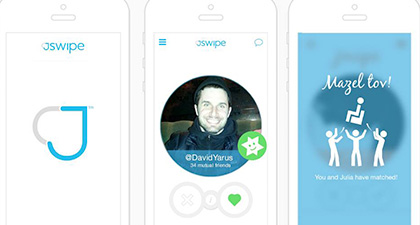These days, everyone and their bubbe is on Tinder.
If, however, you’ve been coupled since before the Internet and haven’t kept up with newfangled mating rituals of kids these days, you may be unfamiliar with the prolific dating app and the fact a virtually identical Jewish version, JSwipe, started last spring. But for those angling for a shidduch, it’s potentially big news.
Like Tinder, which launched in 2011, JSwipe is a free, mobile app that users download to their phones. By allowing the service to pull basic information from their Facebook profiles, such as photos, and track their GPS co-ordinates, users are matched with individuals who fit their selected age range, gender preference and radius.
When presented with a potential match, they can swipe left, signifying disinterest, or right, for the opposite. When two people swipe right for each other, they’re both notified of the “match” and can start messaging.
Unlike longer-standing dating websites, Tinder and JSwipe do away with hefty questionnaires about people’s interests, and place unabashed focus on physical attraction, highlighting photos above all else.
The key difference, of course, is that JSwipe is designed for those wanting to exclusively date within the faith. It includes setting options, like “Kosher” or “Not Kosher” and, under “Denomination,” the choice between “Just Jewish,” “Willing to Convert,” “Other,” “Conservative,” “Reform” or “Orthodox.”
According to JSwipe’s Brooklyn, N.Y.-based founder, 28-year-old David Yarus, the app recently logged 100,000 users in more than 70 countries (he wouldn’t provide Canada-specific numbers), and is mainly publicized through word of mouth.
He said users are “pretty evenly balanced” when it comes to denomination, with a skew toward Conservative.
“People have told us there’s a quality pool of people in every category.”
Yarus, who’s worked in social media for Jewish organizations such as Birthright and Hasbara Fellowships, said the moment he used Tinder, he was “blown away by how futuristic it is” and immediately thought, “This needs to exist for Jews.”
Asked about JDate, which was until recently considered the premier Jewish dating website, Yarus said all “older [dating] platforms” have likely been disrupted by the streamlined, millennial-friendly “swipe experience,” and that asking users to pay, as JDate does, is outdated.
“It’s a clunky user experience… the amount of time and money people put in doesn’t equal the value they get out of it,” he said. “I hear people talking about [JSwipe] at brunch, swiping with friends. It’s the cultural standard for the next generation of Jews.”
Still, it’s unclear whether JSwipe has caught on in a big way north of the border.
Jessica (not her real name), 27, of Toronto, heard about JSwipe from an American friend and joined in July. She was unimpressed and hasn’t used it much since. “It was pretty pathetic,” she said. “Originally, there were only like two people on it [in Toronto], though maybe there’s a better selection now.”
Though committed to marrying a Jew, Jessica is also on Tinder, where she’s had better luck. “There are still more Jews on Tinder than there are on JSwipe,” she said, explaining she’s able to filter out non-Jewish prospects by checking mutual Facebook friends.
Though she’s gone on a number of Tinder dates and is casually seeing a Jewish guy she met through it, Jessica observed, “No one seems to be that serious on Tinder or JSwipe. People have too many options on these apps. They’re flaky. They don’t know what they want.”
Marty (not his real name), 35, and also from Toronto, joined JSwipe a month ago. He has mixed feelings about it.
On one hand, he said, “It brings you a community of single Jews you wouldn’t otherwise have a chance to talk to,” yet, it’s difficult to get a conversation going with people, even after they’ve matched. “It takes a few days for people to respond, or it doesn’t go anywhere… I think because people are bombarded with options.”
He’s also on JDate, where he’s had mixed results, and, like Jessica, he’s screened for Jews on Tinder, but struggled to resist the “temptation” of non-Jewish women.
Tinder has garnered a reputation for being a “hookup app”– a platform for arranging casual sex, but Marty doubts JSwipe is being used this way. “If you’re looking for someone Jewish, you’re identifying that you’re looking for something meaningful,” he said.
Yarus said it’s completely up to users to decide what kind of JSwipe experience they want to have. “We’re democratizing the shidduch, to give you the power to sift through people in your community, your city, the world,” he said. “You shouldn’t have to rely on other people to know who’s eligible.”
